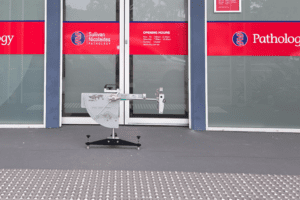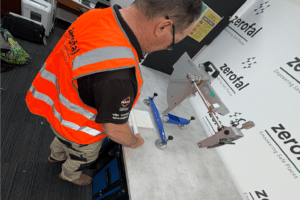Should You Test with TRL or 4S Rubber?
Zerofal’s national courier service takes the work out of getting your samples tested. We handle the booking and labels—freight is added to your invoice. Just pack and stick.
Wet pendulum results depend on one critical variable: the slider rubber. Under AS 4586–2013, you must choose either:
4S (Slider 96):
- General footwear simulation
- Used for most indoor and outdoor commercial settings
TRL (Slider 55):
- Softer compound, simulates bare feet or soft soles
- Used for ramps, pools, wet barefoot zones, and some external paths
Some surfaces test well under one but fail the other. For example:
- A P4 result with 4S may only be P2 with TRL
- A tile near a pool may need both ratings to satisfy NCC or HB 198-2014
Zerofal advises on the correct slider based on:
- NCC Table D2.14 or site-specific specs
- Intended installation zone
- Market expectations for use cases
Don’t guess - ask.
Zerofal will help you choose the correct slider and ensure your AS 4586–2013 test is valid for its application.
4S (Slider 96) simulates standard footwear for most commercial settings. TRL (Slider 55) simulates barefoot or soft soles and is used for ramps, pools, and wet barefoot areas.
Slip ratings can shift dramatically between sliders. A surface that passes with 4S may fail with TRL in barefoot zones.
TRL is required for wet barefoot areas like pools, showers, ramps, and some outdoor paths.
Yes. In some areas—like pool surrounds—both 4S and TRL tests may be needed for NCC or HB198 compliance.
Check NCC Table D2.14 or consult Zerofal. We advise on the correct slider based on standards, site use, and safety obligations.
Explore more

The Five Moments You Should Always Re-Test a Floor
Learn the five moments when re-testing slip resistance matters most — and how timing reduces risk more effectively than routine checks.

When Should a Product Be Re-Tested? The Question Manufacturers Get Wrong
Learn when flooring products should be re-tested for slip resistance and why one result rarely covers a full product range.

Why January Is When Latent Slip Risk Shows Up in Commercial Buildings
January maintenance and reopening cycles can increase slip risk. Learn why early-year verification matters for commercial buildings.
Stay Ahead of Safety Standards
Join the Zerofal newsletter for actionable insights on slip testing, compliance updates, and smart prevention strategies. No spam – just practical safety advice.
